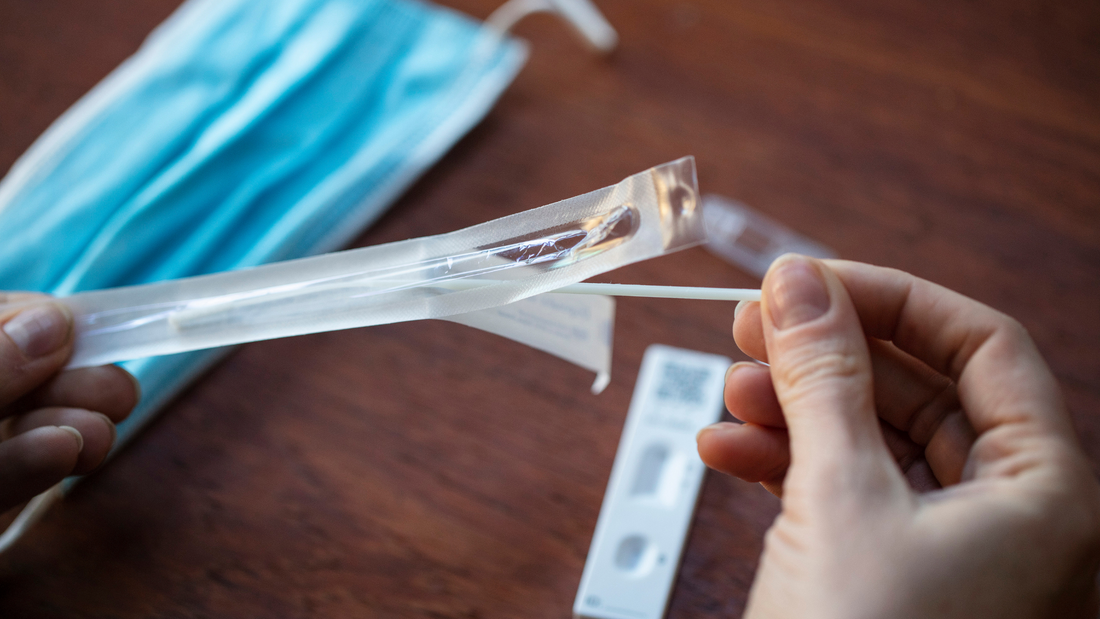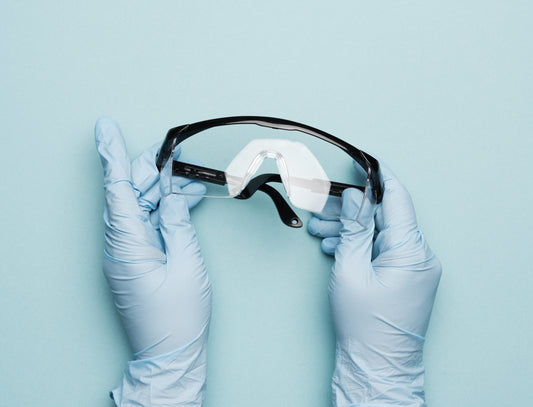
Can Rapid Tests Detect Omicron and Other Variants?
Summary
If you’re short on time, here are the main takeaways from this article:
- Rapid tests can detect Omicron and other variants, if testing is performed correctly
- Accuracy will vary and may not provide the same confidence as a PCR test, but it is effective as a data point to help in your everyday decision making
- Sensitivity of rapid tests to Omicron is highest when users combine oral and nasal samples
- Our recommendations for the best rapid antigen tests you can use for maximum results
How do rapid tests work?
With the pandemic coming into full swing in mid 2020, government authorities and the medical community around the world worked to develop diagnostic tools that would be able to keep up with and help us contain its spread. One of the tools developed is what we know today as a self-test or OTC (over the counter) test kit we can use to help us know whether we are infected or can infect others with COVID-19.
Yet, as the COVID-19 virus evolved, multiple strains and variants have emerged. Each variant comes with an onslaught of new parameters and challenges, and they have refined the role of rapid tests.
In this section, we’ll briefly go over how rapid tests work, what they are effective at doing, and how to understand the results of the test.
What is an antigen?
According to accredited health content provider, MedLine Plus, an antigen is “any substance that causes your immune system to produce antibodies against it. This means your immune system does not recognize the substance, and is trying to fight it off.”
This basically refers to things like viruses, such as COVID-19. Hence, an antigen test is designed to detect the presence of any substance that causes your immune system to produce antibodies against it.
More specifically, a rapid antigen test is designed to help you detect the presence of a virus like COVID-19 in a short amount of time and in a cost-effective manner.
How does the rapid antigen test work?
The rapid antigen test detects proteins on the surface of the COVID-19 virus. This is usually done through a nasal or throat swab (sometimes both combined). The test takes a sample of bodily fluid, mixed in a liquid solution, and then added to the results cartridge. Depending on the test kit you use, it should take about 15 minutes to provide you with a result.
What are rapid antigen tests effective at detecting?
Rapid antigen tests are designed to test whether you are likely to be infectious. There is an important nuance here to understand. Someone can be infected with COVID-19 but not be infectious. As well, someone can be infected with COVID-19 and be infectious.
The difference is in what experts term the “viral load”. The viral load indicates how much of the virus is in your system. The higher your viral load, the more likely it is that you can pass it on to someone else.
Rapid antigen tests are designed to detect the latter. This means that an antigen test may not be effective at testing everyone who has COVID-19. It would only be effective at testing those people whose viral loads are higher and thus considered “infectious”.
Differences in the current and past strains of Covid-19
When it comes to rapid testing, there is much discussion around its effectiveness given different strains of the virus. As time progresses, the nature of viruses is that they evolve in some way.
With each new variant or iteration, the potency rate of infection will also change. This also affects how the rapid test responds to each variant. Overall, however, the data seems to suggest that there is an important place for rapid tests even with some of the new Covid-19 variants, such as Omicron BA.1 and BA.2.
Compared to previous variants, like Delta, Omicron is far more infectious. Its symptoms have also changed, although not completely, from previous versions of the virus.
To better understand where we stand in relation to the current dominant strains of the virus, a good place to look is the Government of Canada’s daily COVID-19 epidemiological summary report.

In this report, and as can be seen below, the current weekly variant breakdown shows that the main variants of concern are Omicron BA.1.1 and BA.2.
With the Omicron sub-variants taking the spotlight, and the Delta variant becoming practically obsolete, many of you are right to ask about the effectiveness of rapid tests and Omicron.
A detailed study on the effectiveness of various rapid tests on new variants, including Omicron, was undertaken by the Science Table Covid-19 Advisory for Ontario. In this study, the authors studied the sensitivity of different antigen tests for the Omicron variants as compared to the Delta variant. They looked at tests that use nasal and oral samples to detect the infectiousness of COVID-19 in a person.
Here’s what they found:
- Rapid antigen tests are less sensitive for the Omicron variant compared to the Delta variant in nasal samples, especially in the first 1-2 days after infection
- Rapid antigen tests can more reliably detect infectious cases of the Omicron variant in combined oral-nasal samples
- A single negative rapid antigen test result cannot reliably rule out infection, yet a single positive result should be taken seriously and appropriate measures to isolate should be taken
Here’s an illustration of one of the results of the study performed by the advisory:

In this graph, you can see that the sensitivity (effectiveness) of rapid tests in detecting Omicron was highest (100%) via oral sampling. This is opposite to what we see in the Delta variant, where rapid testing was more effective via nasal sampling.
Pros and Cons of rapid antigen tests and Omicron
It should be clear by now that although rapid tests are not perfect, if done correctly, they can still be just as effective as they were with the Delta variants.
Below, we’ve put together a table of some pros and cons of the rapid antigen tests in relation to Omicron and possibly other variants.
Following this table, we’ll share some recommendations we’ve seen the experts give when it comes to your rapid testing strategy.
| Pros | Cons |
| Easy, quick, and cost effective way to protect yourself and others if infectious | May require more than one testing to be done for higher confidence and accuracy |
| Peace of mind knowing that, if done right, you can make a better informed decision | If antigen tests purchased are not high quality or health canada approved, you may run the risk of inaccurate results multiple times over |
What you should know when deciding to use an at-home rapid antigen test for omicron
Now that you know some of the data behind rapid antigen tests, here are some recommendations from experts on how you can use them most effectively:
- Combining oral and nasal sampling may improve the sensitivity of rapid antigen tests
- A single negative rapid antigen test result cannot reliably rule out infection – have a plan in place for multiple iterations
- If you test positive on the first try, then assume infection and take the necessary precautions
- You can separate multiple tests by 24 or 48 hours if you are showing symptoms. In addition, follow the guidelines set out by your local authorities if you are symptomatic
Best available at-home rapid antigen tests to consider for omicron and other variants
Now that you have a more informed outlook on rapid testing, you might want to know which rapid tests are the best ones to get on the market today.
Here is a quick list of some of the best rapid tests with their benefits, in no particular order:
ROCHE SARS-CoV-2 RAPID ANTIGEN TEST (25 TESTS/KIT)
-
-
- Kit Includes: Test device (individually in a foil pouch with desiccant), Extraction buffer tube, Nozzle cap, Sterile swab, Film (can be attached to the test device when performing outdoor testing), Instructions for use and Quick Reference Guide
- Getting a quick result within 15-30 minutes – no need for a follow-up appointment to discuss the result
- Allowing decentralised testing or access to testing in areas where laboratory testing is not available
-
-
-
- No instrument required
-
-
-
- Price: $249.99
-
VERITOR SYSTEM FOR RAPID DETECTION OF SARS-COV-2 (30 TESTS/KIT)
-
-
- Kit Includes: 30 sterile swabs, 30 single use test devices, 30 tubes containing extraction reagent, 1 SARS-CoV-2 (+) Control Swab, 1 SARS-CoV-2 (-) Control Swab and Instructions for Use
- Can be used with BD Veritor Plus System Analyzer (sold separately)
- Price: $299.99
-
COVID-19 ANTIGEN RAPID TEST DEVICE
-
-
- Box of 5 includes: 5 Packed test devices, 5 extraction tubes, 5 nozzles with filters, 1 tube stand, 5 individually packed Swabs, and 5 single use of extraction buffer
- Box of 25 includes: 25 Packed test devices, 25 extraction tubes, 25 nozzles with filters, 1 tube stand, and 2 bottles of extraction buffer
- Storage: 2-30°C/35.6-86°F
- Results in 15 minutes
- Price: $74.99 – $299.99
-








